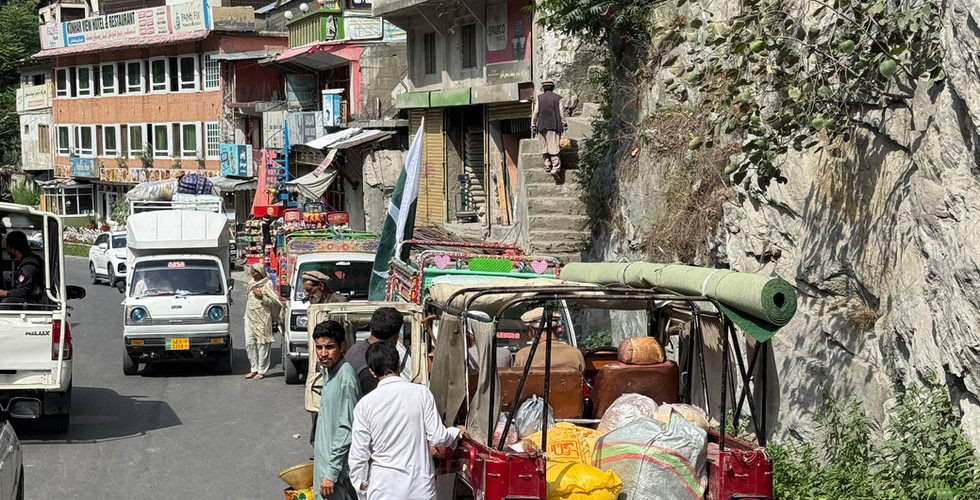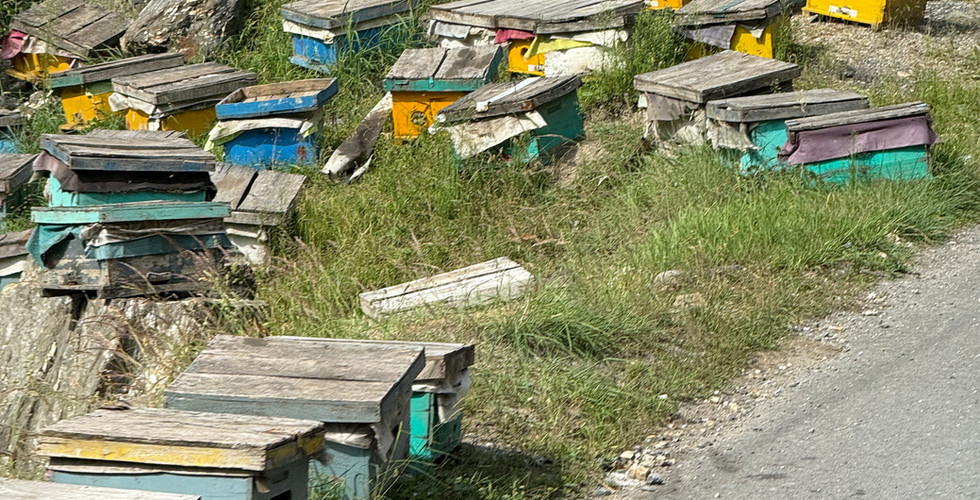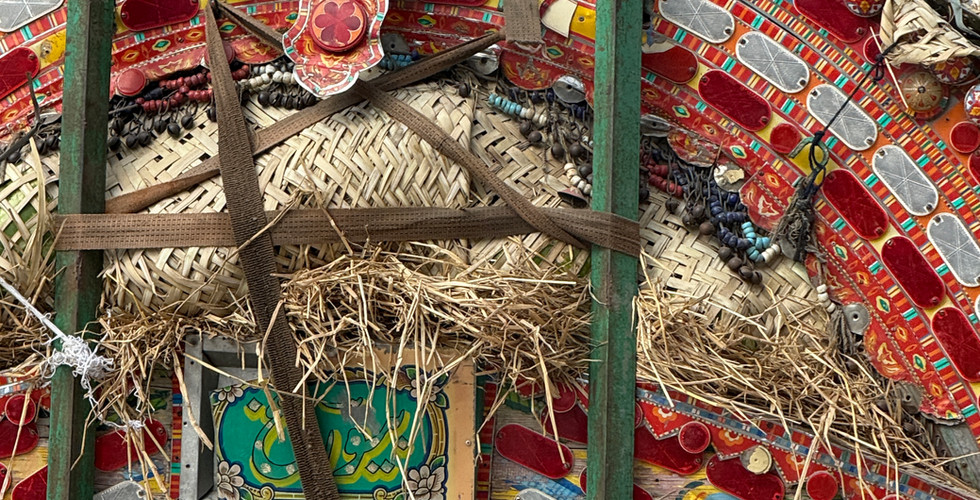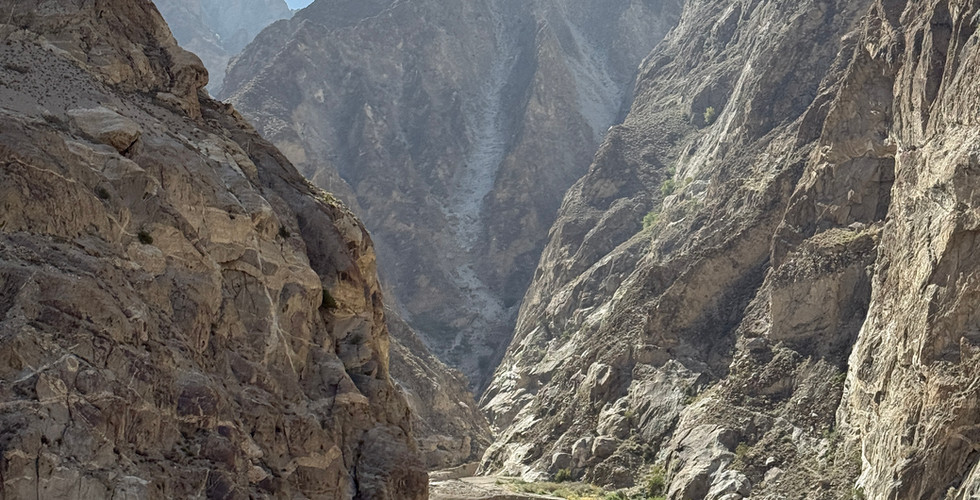Escorted Across Pakistan: Guns, Landslides and a Narrow Escape to China
- David Stephenson
- Oct 31, 2025
- 6 min read
Updated: Jan 8

“Security is mostly a superstition. It does not exist in nature.” — Helen Keller
A Movie Escort at the Border
The sirens hit before the dust of the border crossing had even settled. Within minutes of entering Pakistan, we were in a convoy straight out of a movie — armed escorts sweeping traffic aside, rifles visible at the window, our truck suddenly the star of someone else’s action script.

Our armed guard and support car with 2 more armed officers and a driver.
The change from Afghanistan was obvious too - cleaner streets, English road signs, even women walking alone - but it was quickly overshadowed by the guns at our side. Afghanistan had felt far more chaotic, with Taliban checks at every turn - yet the people
there were warmer, perhaps because tourists are so rare.

A quick check before a new armed guard takes over.
On our entry to Pakistan, we were picked up by an armed police escort, and told it was necessary for our safety. They took us from the border to our overnight hotel (we were told we couldn't stay in the truck for security reasons, just as we were in Afghanistan). At our hotel, an armed guard was waiting for us, and so after the police left, the new armed guard took over. The rifles had decided for us: the evening would be spent inside the hotel.
The next morning, another escort arrived, lights flashing, waving us through toll roads without stopping, halting whole lines of traffic so we could glide through without stopping.
It was thrilling in one sense, unnerving in another - theatre and tension all at once.
When we asked why we needed an escort, the answers were vague. One officer muttered “Taliban,” explaining this was a different branch from the Afghan fighters, and that they were targeting police, soldiers, and foreigners alike. And our oversized truck made us too visible, too tempting a target for the Taliban. In truth, the escort felt less like protection and more like theatre, though I took some comfort in knowing we weren’t entirely on our own despite the surreal feeling of having our own armed guard.
The police had also informed us that the escort would stay with us for three days, right up to the Chinese border.
Roads of Risk and Reward
For us, it was mostly about making distance. Our initial plan was to cross Pakistan to India, but due to political tensions, that border was closed, so we had a 6000km (almost 4000 miles) detour to enter India via China to Tibet and then to Nepal and finally into India, and we had to meet fellow travellers in China, a group of motorbikers we were scheduled to drive with across China, so Pakistan was a line on the map to be crossed quickly, now.
We saw little in terms of sights, but saw much of the country’s reality. People seemed to live at a higher standard than in Afghanistan; roads were more organised, uniforms sharper, signs bilingual, spirits lighter. And despite the escorts, we felt oddly more at ease.
We drove the Gilgit Pass, the Karakoram Highway, and the Khyber Pass - all on Charlotte’s bucket list for years. But dreams rarely come without risk. Landslides scarred the roads, tarmac sliding into rivers before our very eyes, trucks teetering on the edge as tarmac fell into parallel rivers. Every few kilometres, diggers clawed at fresh debris to keep the roads clear before the next landslide meant they had to start over.
Charlotte sat silent for long stretches - the roads she had wanted to drive the most were now the ones she feared most. She had been delighted to tick them off her list, but the road conditions soon turned that delight into unease. Relief only came once we cleared each stretch without rocks above us giving way.

There were many beautifully decorated Pakistani trucks.
The Karakoram Highway is sometimes referred to as the “Eighth Wonder of the World,” an engineering feat that links Pakistan and China across some of the harshest terrain on Earth.
It is also notorious for constant landslides, collapses, and fatalities - beauty and danger in equal measure. Crazy to think just how vulnerable we were in a 12.5-tonne truck, lumbering across roads that seemed barely able to hold their own weight.
A week after we left, a landslide killed 43 people on the very road we had taken. That knowledge still chills me.
A Fragile Beauty
Northern Pakistan was a feast for the eyes - snow peaks, glaciers, rivers foaming against the rocks. Villages clung to mountain sides; some cut in half by previous land slides. Many houses lay derelict where rock and mud had swept through and destroyed much of the structures, scars of earlier landslides visible in every valley.
Yet life carried on with a quiet stubbornness. In the villages of Hunza and Gilgit, families tended orchards of apricots and apples that somehow flourished at altitude, their green terraces a shock of colour against the stone. Every tea stop offered “chai” with an insistence born of mountain hospitality.
We passed places of almost mythic renown - the Hunza Valley, with its turquoise Attabad Lake formed by a landslide only a decade ago, still swallowing the road beneath it; Nanga Parbat looming somewhere beyond, known as “Killer Mountain” for the lives it has claimed.
We wondered how people slept at night, knowing the mountain could take their home by morning.
Blocked at Sost
Tired and frayed, we reached Sost, the last town before China. Ready to cross, we were told the road was blocked by a demonstration.
Our armed escort bid us farewell, and we were finally alone.
Local business owners had barricaded the road in protest against new council taxes that, they said, made it nearly impossible to stay in business.
I went to speak with them and tried reasoning, asking them to remove their roadblock so that we, the tourists, could pass. I said, but they weren’t a part of their struggle, and it made no sense to block our access, but they were not for budging.
We were stuck, and this was a real problem as we had a rendezvous with a load of bikers, and we had to make that rendezvous to get across China. You are not allowed to travel without a guide in many parts of China.
Our saviour came in the form of a local man who took pity on us, guided me to a dirt track looping behind the blockade in town. The ground was rough and unpassable by car, but our truck’s 4x4 capabilities helped us crawl threw. Relief surged - until we saw the steel power cables hanging low across the path we wanted to cross. Our normal method is that we would nudge them up with a broom handle, but these were live, uninsulated, and untouchable.
After a few frantic phone calls, a policeman arranged to have the power cut, and so we could pass. Lifting the cable with caution, we crawled under it in our truck. As we edged through, wondering how many homes were left without power, the power was cut for our crossing. Oh, to be a white tourist in Pakistan. Again, parallel worlds.
No Guarantees
Pakistan taught us that danger wears many faces: rifles at your window, rocks above your cab, or wires across the road. Escorts and diggers gave the appearance of control, but none of it really made us safer. A landslide could come down without warning, or a handful of shopkeepers could block an international border for days.
Charlotte’s long-dreamed passes turned into long silences. The roads she had wanted most became the ones she feared most, and the only relief was getting through each stretch in one piece. Bucket lists don’t show the exhaustion in your shoulders or the ache in your stomach when the cliff edge drops away beside you.
Every border seemed to tell a story about power. Afghanistan had dust and tension, Pakistan had rifles and escorts, and China was waiting with its own brand of order. Different masks, same fragility underneath.
And that was the real lesson: the journey could be stopped by anything - a rockfall, a protest, a loose cable across the road. All the rules and uniforms in the world didn’t change the fact that we were just moving forward on borrowed time, hoping the mountain or the politics would hold off for one more day.
Thanks for reading, we hope you enjoyed it - if you haven't already, consider subscribing for updates on new blog releases.
....and if you want an insight into where we are and we we are doing in between blogs do check us out on Facebook.










































































Charlotte and Dave another fantastic adventure love your stories they are so enlightening looking into other countries and lives is fascinating take care safe travels gxd
Reading this, I find myself feeling very sorry for the local people you are stepping on to achieve your personal goals of traveling through their lands - cutting power so you can travel through, personal escorts (claiming "safety" for you, requiring funds that are taking away from their funds for infrastructure or other needs. I'm appreciating your photos but at what cost to those communities you're possibly exploiting or exposing? Just wondering what your travels are costing the communities you're trying to highlight?
Another exciting read that put me right there with you.
Good luck and safe travels.
Dave
Wareham Dorset.
Hi again, just catching up.
Great story and pictures, your words put you right next to you in the cab. Chilling stuff!
Stay lucky!
Robbo,
Anglesey
Riveting read as always. Brings your experiences to life and demonstrates how very different parts of the world that we are unlikely to visit really are. Stay safe!